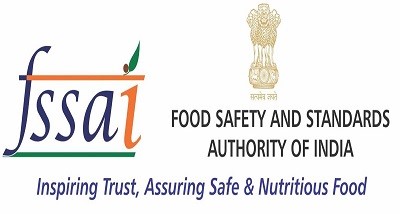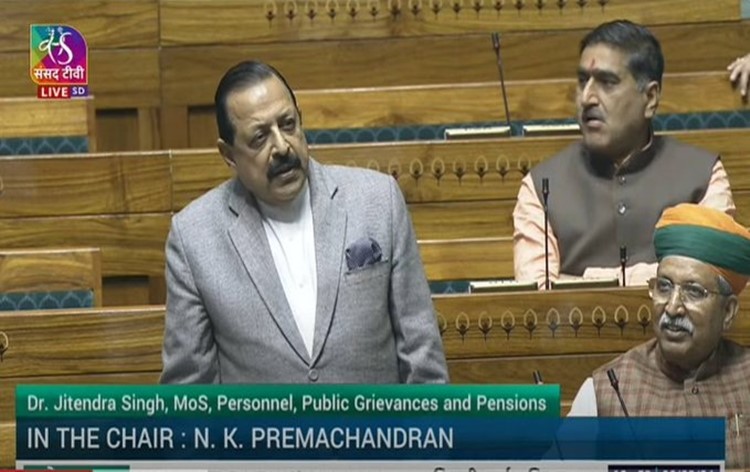FSSAI's efforts to Streamline Food Safety and Standards

Context:
- FSSAI proposes overhaul of food safety regulations for streamlined compliance in India’s food industry.
Key Details:
- To facilitate business operations in India’s food industry, the Food Safety and Standards Authority of India (FSSAI) has initiated proposals for a comprehensive revamp of the nation’s food safety and standards regulations.
- These proposals were deliberated upon in the 43rd meeting of the FSSAI, presided over by Union Health Secretary Apurva Chandra, representing a crucial stride towards the realization of the ‘One Nation, One Commodity, One Regulator’ framework.
About the Food Safety and Standards Authority of India (FSSAI):
FSSAI has constituted 21 subject-specific Scientific Panels under Section 13 of the FSS Act, which consists of independent scientific experts, to act as the risk assessment bodies and provide their considered scientific opinion.
- The Food Safety and Standards Authority of India (FSSAI), established in 2008, plays a pivotal role in upholding food safety and quality standards across the nation. Since its operational inception in 2011, FSSAI has been dedicated to monitoring and maintaining food hygiene and quality to ensure the well-being of every citizen.
The FSS Act was a consolidation of various older acts like:
- Prevention of Food Adulteration Act, 1954
- Fruit Products Order, 1955
- Meat Food Products Order, 1973
- Vegetable Oil Products (Control) Order, 1947
- Edible Oils Packaging (Regulation) Order 1988
- Milk and Milk Products Order, 1992
Foundation and Legal Framework:
- FSS Act 2006: The foundation of FSSAI lies in the Food Safety and Standards Act of 2006, which consolidated various food-related laws and paved the way for its establishment. The act aims to lay down science-based standards for food articles and regulate their aspects from manufacture to distribution, ensuring safe and wholesome food for consumption.
Organizational Structure:
- Headquarters and Regional Offices: FSSAI operates from its headquarters in New Delhi and has six regional offices strategically located across the country. This extensive network ensures nationwide coverage and enforcement of food safety standards.
- Composition: FSSAI's leadership comprises a Chairman and 22 members, with a notable requirement that one-third of the members must be women. Additionally, it includes scientists, researchers, and specialized committees to ensure expertise in food safety matters.
Functions of FSSAI:
- Setting Rules and Guidelines: FSSAI plays a critical role in establishing and updating regulations and guidelines for food safety and quality. These standards encompass various aspects of food production, handling, packaging, and distribution, ensuring compliance with international benchmarks and scientific principles.
- Granting License: One of the primary functions of FSSAI is to issue licenses and certifications to food businesses, including manufacturers, distributors, and retailers. This process involves thorough scrutiny of hygiene practices, infrastructure, and compliance with regulatory requirements. The licensing system serves as a mechanism to weed out substandard operators from the food industry.
- Testing Food Standards: FSSAI conducts extensive testing and analysis of food samples to verify compliance with safety and quality standards. This involves examination of parameters such as microbiological contamination, chemical residues, nutritional content, and labeling accuracy. Rigorous testing ensures that only safe and high-quality food products reach consumers.
- Regular Audits: FSSAI conducts regular inspections and audits of food establishments to assess their adherence to regulatory norms. These audits cover various aspects, including hygiene practices, storage conditions, pest control measures, and documentation. Through proactive monitoring, FSSAI aims to identify and rectify non-compliance issues to maintain food safety standards.
- Spreading Food Safety Awareness: FSSAI undertakes extensive awareness campaigns and educational initiatives to educate consumers, food handlers, and businesses about the importance of food safety and hygiene. These efforts include workshops, seminars, public service announcements, and digital outreach programs aimed at promoting safe food practices and behavior.
- Maintaining Records and Data: FSSAI maintains comprehensive databases of registered food businesses, inspection reports, testing results, and consumer complaints. This data serves as a valuable resource for monitoring trends, identifying emerging risks, and formulating evidence-based policies and interventions to improve food safety outcomes.
- Government Liaison and Policy Assistance: FSSAI collaborates closely with government agencies, industry stakeholders, and international organizations to develop and implement food safety policies and regulations. It provides technical expertise, research inputs, and regulatory guidance to policymakers to address emerging challenges and align national standards with global best practices.
Initiatives by FSSAI:
- Eat Right India: This initiative aims to promote healthy eating habits and lifestyles among Indian citizens. It includes campaigns to raise awareness about balanced nutrition, food labeling, and the importance of consuming safe and wholesome foods.
- Clean Street Food: FSSAI's Clean Street Food program focuses on improving the safety and hygiene standards of street food vendors, who play a crucial role in providing affordable and accessible meals to millions of people. The initiative involves training vendors in food handling practices, sanitation, and waste management to minimize foodborne illnesses.
- Diet4Life: This initiative focuses on addressing diet-related health issues such as obesity, diabetes, and malnutrition through dietary interventions and education. It provides guidance on making healthier food choices, meal planning, and portion control to promote overall well-being.
- Save Food, Share Food, Share Joy: FSSAI's campaign against food wastage encourages individuals, businesses, and institutions to reduce food wastage and redistribute surplus food to the needy. It emphasizes responsible consumption, efficient storage, and donation of excess food to minimize wastage and ensure food security for vulnerable populations.
- World Food Safety Day Celebration: FSSAI actively participates in global initiatives such as World Food Safety Day to raise awareness about food safety issues and promote international cooperation in addressing foodborne hazards. The celebration highlights the importance of safe food practices in protecting public health and fostering sustainable food systems.
Challenges:
- Laboratories for Rigorous Testing: Establishing and maintaining well-equipped and accredited testing laboratories across the country remains a challenge for FSSAI. Limited infrastructure and resources hinder the capacity to conduct thorough and timely testing of food samples, leading to delays in quality assurance processes.
- Qualified Manpower: The shortage of trained professionals, including food safety officers, microbiologists, and food technologists, poses a challenge for FSSAI in effectively implementing and enforcing food safety regulations. Recruiting and retaining skilled personnel with expertise in food safety and quality assurance is essential for enhancing regulatory oversight.
- International Alignment: Ensuring alignment with international food safety standards and regulations requires continuous monitoring and benchmarking by FSSAI. Harmonizing domestic standards with global best practices necessitates robust regulatory frameworks, capacity-building initiatives, and collaboration with international agencies to address emerging food safety challenges.
- Technological Advancements: Keeping pace with technological advancements in food testing, surveillance, and traceability is crucial for FSSAI to enhance its regulatory capabilities. Access to state-of-the-art equipment, analytical tools, and digital platforms is essential for conducting risk assessments, data analysis, and monitoring of foodborne hazards in a rapidly evolving food landscape.
- Comprehensive Licensing: Streamlining the licensing process and ensuring compliance by all food businesses pose logistical and administrative challenges for FSSAI. Enhancing transparency, accountability, and efficiency in license issuance, renewal, and enforcement is essential for promoting regulatory compliance and safeguarding public health.
Closing thoughts
- FSSAI plays a pivotal role in ensuring food safety and quality standards in India through its multifaceted functions, initiatives, and regulatory efforts. Despite facing various challenges, FSSAI remains committed to its mandate of protecting public health and promoting consumer confidence in the food supply chain. Addressing these challenges requires concerted efforts from all stakeholders, including government agencies, industry partners, and civil society, to build a robust and resilient food safety ecosystem.
https://newsonair.gov.in/Text-Bulletin-Details.aspx?id=45470
https://fssai.gov.in/
https://en.wikipedia.org/wiki/Food_Safety_and_Standards_Authority_of_India
https://www.thehindubusinessline.com/economy/fssai-approves-amendments-in-regulations-to-do-away-with-agmark-bis-certification-for-food-products/article67814436.ece
https://fssaiindia.in/
https://www.business-standard.com/india-news/only-fssai-certification-would-be-mandatory-for-food-products-124020501517_1.html
https://www.thehindu.com/news/national/fssai-directs-airline-caterers-to-comply-with-food-safety-regulations/article67748386.ece
https://www.newsonair.gov.in/News?title=FSSAI-approves-amendments-in-regulations-to-do-away-with-Agmark%2C-BIS-certification-for-food-products&id=476622
Motion of Thanks to President's Address in Rajya Sabha
Context
- Rajya Sabha today resumed discussion on the motion of thanks to President Droupadi Murmu's address to the joint sitting of both the Houses of Parliament.
Key Details:
- Prime Minister Narendra Modi will reply to the discussion this afternoon. Participating in the discussion, Samajwadi Party leader Jaya Bachchan questioned the government over its earlier claim of doubling farmer’s income.
- She claimed that currently, the growth rate of farmer’s income is just 3.5 percent.
- Mrs Bachchan also talked about farmer suicide in the country. Independent member Kartikeya Sharma said India has made significant progress in various sectors over the past decade. The discussion is underway.
About Motion of Thanks:
|
Definition
|
- A motion expressing gratitude for the President's Address to the Parliament at the beginning of each session.
|
|
Initiation
|
- Presented by a member of the ruling party.
|
|
Purpose
|
- To convey the gratitude of the Parliament to the President for addressing the joint sitting and outlining the government's policies and programs.
|
|
Content
|
- Acknowledges the President's speech, discusses government policies, and may highlight areas of agreement or disagreement.
|
|
Debates and Discussions
|
- Members of Parliament participate in debates and discussions on the Motion of Thanks.
|
|
Amendments
|
- Members can propose amendments to the Motion of Thanks.
|
|
Vote
|
- A vote is taken at the conclusion of the debate. If the motion is defeated, it implies a lack of confidence in the government.
|
|
Importance
|
- Provides an opportunity for the opposition to critique government policies and hold it accountable. It sets the tone for the parliamentary session.
|
|
Symbolic Significance
|
- Reflects the constitutional practice of the President addressing the Parliament and the Parliament expressing gratitude.
|
|
Historical Context
|
- Rooted in the British parliamentary tradition, adapted to the Indian parliamentary system.
|
|
Annual Occurrence
|
- Takes place at the beginning of each parliamentary session.
|
|
Parliamentary Session
|
- Can be a crucial aspect of the Budget Session.
|
|
Outcome
|
- Passage of the Motion indicates the Parliament's confidence in the government. Defeat may lead to political implications.
|
https://newsonair.gov.in/News?title=PM-Modi-to-reply-on-Motion-of-Thanks-to-President%26%2339%3bs-Address-in-Rajya-Sabha&id=476725
Microsoft to train over 2 million people in India
Context
- Chairman and CEO of Microsoft Satya Nadella has announced that the company will train over 2 million people in India in generative Artificial Intelligence skills by 2025.

Disclaimer: Copyright infringement is not intended
Details:
- At an event organised by the company in Mumbai, Mr. Nadella talked about the cooperation between the United States and India on AI.
- The Indian-origin Microsoft chief said that AI can help in boosting GDP growth in the country. He also called India one of the highest-growth markets.
- Speaking about AI, Mr Nadella said that it is a powerful new technology that needs to be diffused fast to every corner of the world.
About the generative AI skills:
|
Natural Language Processing
|
- Proficiency in understanding and generating human-like language using algorithms and models.
|
|
Machine Learning Algorithms
|
- Knowledge of various machine learning algorithms, including supervised and unsupervised learning, to train generative models.
|
|
Neural Network Architectures
|
- Understanding and expertise in designing and implementing neural network architectures, such as GANs (Generative Adversarial Networks) and RNNs (Recurrent Neural Networks).
|
|
Deep Learning Techniques
|
- Familiarity with deep learning methodologies, including deep neural networks and deep reinforcement learning, to enhance generative AI capabilities.
|
|
Data Preprocessing
|
- Skills in preparing and cleaning datasets for training generative models, ensuring data quality and relevance.
|
|
Programming Languages
|
- Proficiency in programming languages such as Python, TensorFlow, PyTorch, and Keras for developing and implementing generative AI applications.
|
|
Statistical Analysis
|
- Ability to perform statistical analysis on data to identify patterns, trends, and insights that can inform generative model training.
|
|
Understanding Domain Context
|
- Awareness and knowledge of the specific domain or industry context in which generative AI will be applied, ensuring relevance and effectiveness.
|
|
Ethical Considerations
|
- Awareness of ethical considerations related to generative AI, including bias mitigation, fairness, transparency, and responsible AI practices.
|
https://newsonair.gov.in/News?title=Microsoft-to-train-over-2-million-people-in-India-in-generative-AI-skills-by-2025&id=476724
India maintains its top spot as leading source market for Sri Lanka tourism
Context
- India maintains the top spot as the leading source market for Sri Lanka tourism.

Details
- With the arrival of 34,399 Indian tourists into the island nation, there has been a surge of tourists coming into Sri Lanka as compared to last year. Seeing a 103 per cent year-on-year change the tourist arrivals for January stood at over 2.08 lakhs as per the data released by Sri Lanka Tourism Development Authority.
- The connectivity between India and Sri Lanka has improved recently as flight services resumed in 2022 between Chennai and Jaffna in addition to other sectors. A ferry service between Kankesanthurai and Nagapattinam also has improved travel between the two countries that have connected through centuries.
About the India- Sri Lanka relations:
|
Historical Context
|
- India and Sri Lanka share deep historical and cultural ties dating back centuries, enriched by Buddhism and trade.
|
|
Diplomatic Relations
|
- Diplomatic relations established in 1948, soon after Sri Lanka gained independence from British colonial rule.
|
|
Bilateral Visits
|
- Regular high-level visits between leaders of both nations to strengthen ties and address mutual concerns.
|
|
Economic Cooperation
|
- Trade and economic cooperation in sectors like textiles, tourism, IT, and infrastructure development.
|
|
Strategic Partnership
|
- Growing strategic partnership, particularly in maritime security and counter-terrorism efforts in the region.
|
|
Defense Collaboration
|
- Collaboration in defense and security, including joint military exercises, training, and equipment assistance.
|
|
Cultural Exchanges
|
- Cultural exchanges through festivals, educational scholarships, and tourism to promote people-to-people ties.
|
|
Development Assistance
|
- India provides development assistance to Sri Lanka in infrastructure, housing, healthcare, and education.
|
|
Shared Regional Goals
|
- Collaboration on regional issues like maritime security, disaster management, and climate change mitigation.
|
|
Challenges and Disputes
|
- occasional disputes over fishing rights, ethnic tensions, and geopolitical influences, but generally managed.
|
https://newsonair.gov.in/News?title=India-maintains-its-top-spot-as-leading-source-market-for-Sri-Lanka-tourism&id=476721
Objectives of Public Examinations Bill in Lok Sabha
Context
- The Lok Sabha today passed the Public Examinations (Prevention of Unfair Means) Bill, 2024.

Details:
- The Bill is intended to prevent unfair means in the public examinations. Public examinations refer to examinations conducted by the Union Public Service Commission, Staff Selection Commission, Railway Recruitment Board, National Testing Agency, and Departments of the central government. The Bill intended to prohibit collusion or conspiracy to facilitate indulgence in any unfair means.
About the Public Examinations (Prevention of Unfair Means) Bill, 2024:
|
Scope
|
- The Bill aims to prevent unfair means in public examinations conducted by various government bodies such as the UPSC, SSC, RRB, NTA, and central government departments.
|
|
Objective
|
- To prohibit collusion or conspiracy to facilitate indulgence in unfair means, including unauthorized access to question papers or answer keys, assisting candidates during exams, etc.
|
|
Protection of Candidates
|
- Candidates defined in the Bill will not be liable for action under the legislation and will continue to be covered under existing administrative provisions of the examination authorities.
|
|
Penalties
|
- Offences under the Bill will be punishable with imprisonment ranging from three to ten years and a fine between ten lakhs to one crore rupees.
|
|
Nature of Offences
|
- Cognizable, non-bailable, and non-compoundable.
|
|
Minister's Assurances
|
- Minister of State for Personnel Dr. Jitendra Singh assured that the Bill does not apply to candidates and is aimed at addressing disruptions and cheating in the examination process.
|
|
Cooperative Federalism
|
- Emphasized that the Bill does not centralize the system but promotes cooperative federalism.
|
|
Language Inclusion
|
- Plans to gradually conduct exams in more regional languages.
|
|
Opposition's Concerns
|
- Questions raised over outsourcing examinations to private agencies and functioning of coaching centers.
|
|
Suggestions
|
- Proposal for the constitution of committees in every state to investigate alleged malpractices in government service recruitment.
|
|
Supportive Voices
|
- Congress, BJP, NCP, BSP, and other party representatives expressed support for the Bill, highlighting the need for justice in public examinations and measures to curb corruption.
|
https://newsonair.gov.in/News?title=Minister-Dr-Jitendra-Singh-Highlights-Objectives-of-Public-Examinations-Bill-in-Lok-Sabha&id=476653







